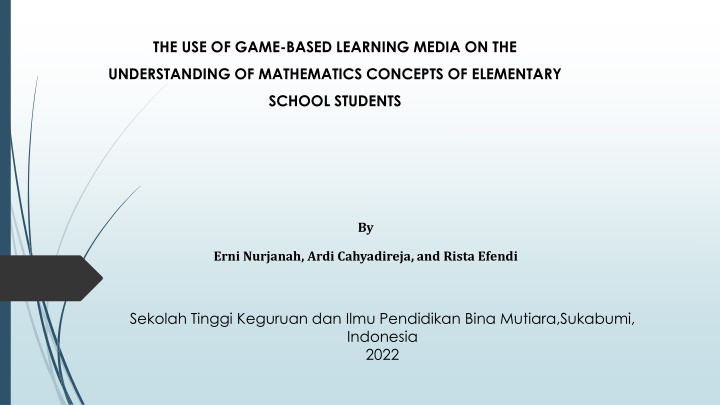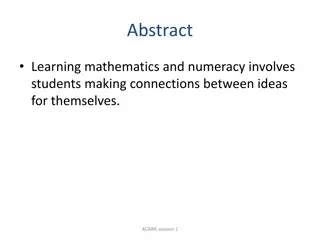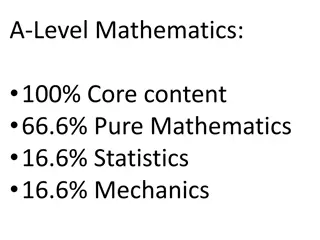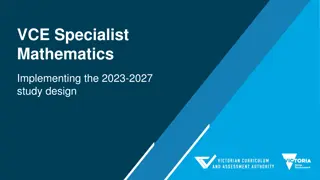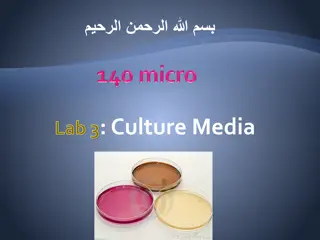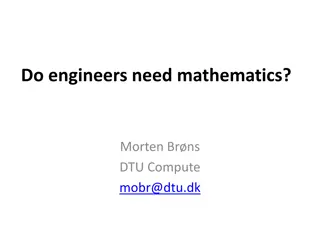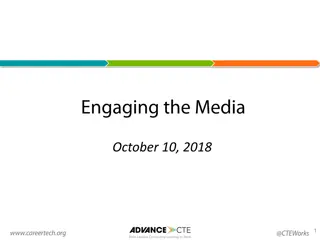Enhancing Mathematics Understanding in Elementary Students Through Game-Based Learning Media
Lack of understanding in Mathematics concepts among elementary school students is a common issue. This study explores the use of game-based learning media to improve students' comprehension. By integrating web-based games, students can engage in interactive learning activities that enhance their understanding of mathematical concepts. The research employs a quantitative approach and a Nonequivalent Control Group Design to measure the impact of game-based learning on students' performance. Through the use of statistical analysis, the study aims to assess the effectiveness of this innovative educational approach.
Download Presentation

Please find below an Image/Link to download the presentation.
The content on the website is provided AS IS for your information and personal use only. It may not be sold, licensed, or shared on other websites without obtaining consent from the author.If you encounter any issues during the download, it is possible that the publisher has removed the file from their server.
You are allowed to download the files provided on this website for personal or commercial use, subject to the condition that they are used lawfully. All files are the property of their respective owners.
The content on the website is provided AS IS for your information and personal use only. It may not be sold, licensed, or shared on other websites without obtaining consent from the author.
E N D
Presentation Transcript
THE USE OF GAME-BASED LEARNING MEDIA ON THE UNDERSTANDING OF MATHEMATICS CONCEPTS OF ELEMENTARY SCHOOL STUDENTS By Erni Nurjanah, Ardi Cahyadireja, and Rista Efendi Sekolah Tinggi Keguruan dan Ilmu Pendidikan Bina Mutiara,Sukabumi, Indonesia 2022
INTRODUCTION The problem in this study is the lack of understanding of the concept of Mathematics at SDN Gegerbitung, whose Mathematics learning scores are still below the KKM A phenomenon that is commonly seen in this modern era is early childhood who are already fluent in operating gadgets or digital technology such as personal computers and smartphones. But its use is more in games that aim for entertainment only Learning by using game-based media is considered to be able to stimulate students' thinking processes and make learning more enjoyable. As explained by Sanjaya (Wulandari et al., 2017: 166), the era of globalization makes children prefer learning by using computers, laptops, tablets, or items related to electronics rather than print media such as books.
The concept in this study refers to game-based learning, a game-based learning technique that can help increase the potential and quality of students in absorbing knowledge. Game-based learning, according to (Mahardhika, 2015: 2), has a significant effect on the teaching and learning process or training process because it can increase student motivation and performance by increasing their interest in modeled learning.
The game-based learning used in this study uses web-based games, which can be accessed via the following link: Game Addition of Story Problems - Free Addicting Game (construct.net).
METHOD This research is a type of quantitative research using a quasi-experimental approach; the design of this study uses a Nonequevalent Control Group Design. The population in this study was all of grade 3 at SDN Gegerbitung, with the first sample of grade 3 B totaling 20 students as the experimental class whose lessons used game-based learning media and the second sample for grade 3 A Atotaling 20 students as the control class. Data on the ability to understand mathematical concepts is measured through a test instrument. To analyze the data in this study, a statistical test was used, namely the independent sample t-test.
RESULTS. The t-test results show the value of Sig = 0.003 <0.05, which means that there is a significant influence between the use of Game-Based Learning on the Understanding of Elementary School Students' Mathematical Concepts. In addition, based on the results of the final test (posttest), an average of 82.25 was obtained for the experimental class. At the same time, the control class received an average value of 72.50.
CONCLUSION There is an effect of the use of game-based learning media on the understanding of mathematical concepts in grade 3 elementary school students at SDN Gegerbitung. This can be shown based on the significance value obtained after the Independent Sample T-Test, namely Sig. (2-Tailed) = 0.003, which can be interpreted that there is an influence between the use of game-based learning on the understanding of elementary school students' mathematical concepts.
